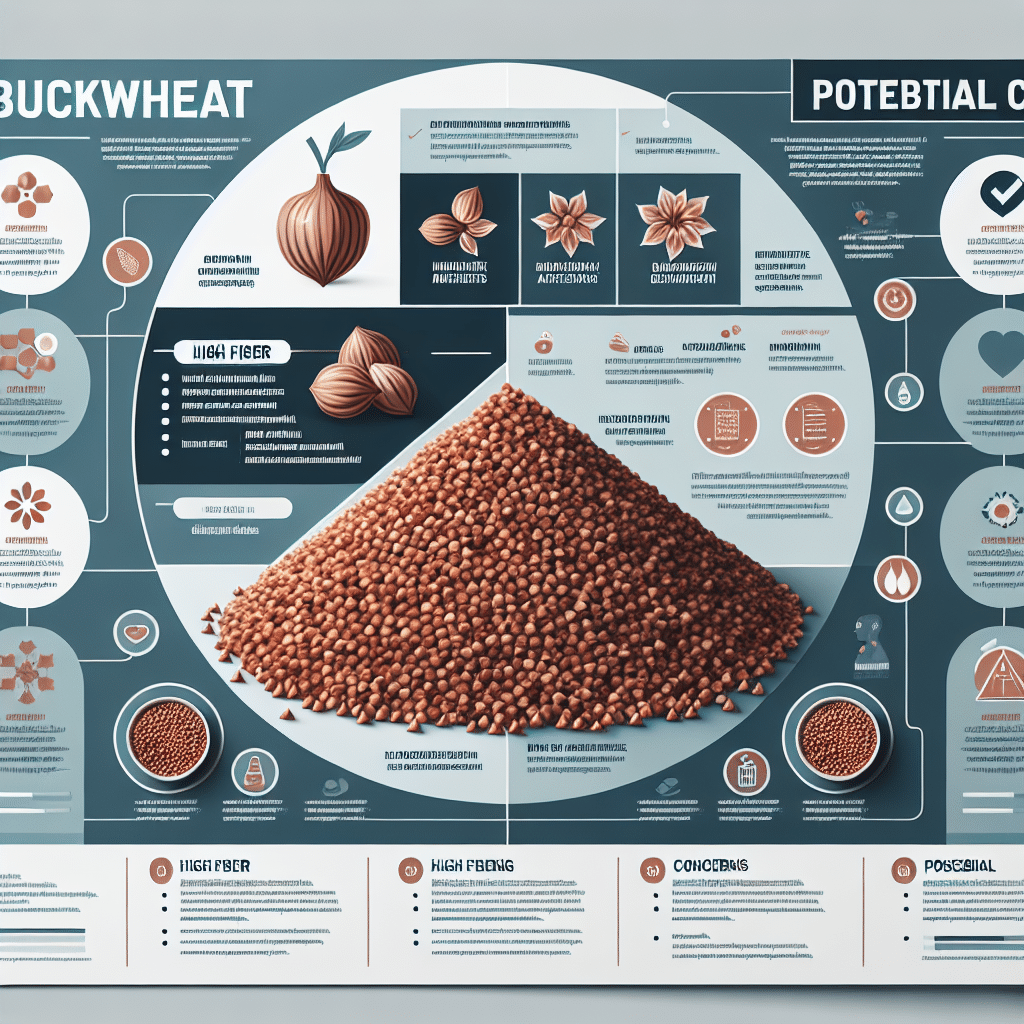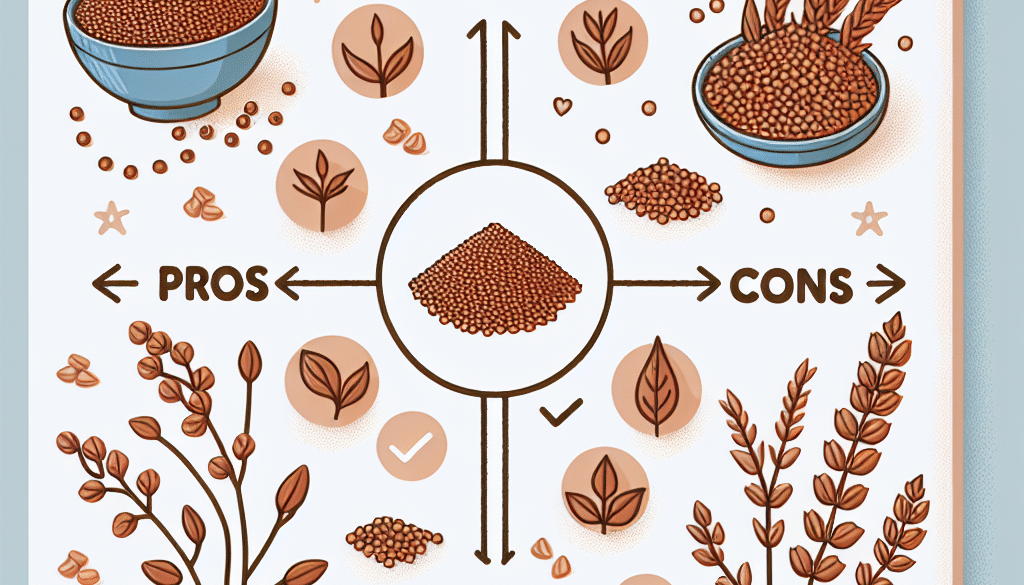What Are The Pros And Cons Of Buckwheat?
-
Table of Contents
Buckwheat: Unveiling the Pros and Cons of This Versatile Seed

Buckwheat, despite its name, is not related to wheat and is not a grain but a seed. It has been a staple food in many cultures for centuries, particularly in Russia, Kazakhstan, China, and Central and Eastern Europe. With the rise of gluten-free diets and the search for alternative sources of nutrients, buckwheat has gained popularity worldwide. This article delves into the advantages and disadvantages of incorporating buckwheat into your diet, supported by scientific research, examples, and statistics.
Pros of Buckwheat
Buckwheat offers a plethora of health benefits that make it an attractive addition to any diet. Here are some of the key advantages:
- Rich in Nutrients: Buckwheat is a powerhouse of essential nutrients. It is high in antioxidants, including rutin, tannins, and catechin, and is a good source of minerals such as magnesium, copper, and manganese. It also provides a significant amount of protein with a balanced amino acid profile.
- Gluten-Free: For individuals with celiac disease or gluten sensitivity, buckwheat is an excellent gluten-free alternative that can be used in place of traditional grains.
- Supports Heart Health: The high fiber content in buckwheat can help reduce cholesterol levels, which is beneficial for heart health. Studies have shown that consuming buckwheat can lead to a decrease in LDL (bad) cholesterol and an increase in HDL (good) cholesterol.
- Good for Blood Sugar Control: Buckwheat has a low glycemic index, which means it causes a slower rise in blood sugar levels. This makes it a suitable food for people with diabetes or those looking to maintain stable blood sugar levels.
- Weight Management: The fiber in buckwheat can also aid in weight management by promoting a feeling of fullness and reducing overall calorie intake.
- Versatile in Cooking: Buckwheat can be used in a variety of dishes, from traditional porridge and pancakes to salads and noodles, making it easy to incorporate into meals.
Cons of Buckwheat
While buckwheat is generally considered healthy, there are some potential drawbacks to consider:
- Potential Allergen: Some individuals may be allergic to buckwheat. Although it’s not as common as other allergens, buckwheat allergies can cause serious reactions in sensitive individuals.
- High in Calories: Buckwheat is relatively high in calories compared to other grains, which may be a concern for those monitoring their calorie intake.
- Contains Phytates: Like many seeds and grains, buckwheat contains phytates, which can bind to minerals and reduce their absorption. However, soaking, sprouting, or fermenting buckwheat can help reduce phytate levels.
- Limited Availability: Buckwheat may not be as readily available as other grains in some regions, and it can be more expensive due to lower demand and production levels.
- Flavor Profile: The distinct, earthy flavor of buckwheat is not to everyone’s taste and may require some getting used to.
Nutritional Profile and Health Benefits
Buckwheat’s nutritional profile is impressive. A 100-gram serving of cooked buckwheat groats contains approximately 3.4 grams of protein, 1 gram of fat, 20 grams of carbohydrates, and 2.7 grams of fiber. This seed is also rich in flavonoids, particularly rutin, which can help improve circulation and prevent blood clots.
One of the most significant health benefits of buckwheat is its impact on heart health. A study published in “The Journal of Nutrition” found that consuming buckwheat protein could reduce blood cholesterol levels, decrease the risk of gallstones, and protect against heart disease.
Moreover, buckwheat’s high fiber content not only aids in digestion but also plays a role in preventing colon cancer. According to research, dietary fiber can bind to carcinogens, removing them from the colon and reducing the risk of cancer development.
Culinary Uses of Buckwheat
Buckwheat’s versatility in the kitchen is one of its most appealing attributes. It can be used in a variety of culinary applications:
- Buckwheat Flour: Used for making gluten-free bread, pancakes, and noodles.
- Buckwheat Groats: Can be cooked similarly to rice or quinoa and added to salads, soups, or used as a side dish.
- Soba Noodles: These Japanese noodles are made from buckwheat flour and offer a healthier alternative to traditional pasta.
- Kasha: Roasted buckwheat groats, commonly used in Russian and Polish cuisine, often served with mushrooms and onions.
Conclusion
In conclusion, buckwheat is a nutrient-dense, gluten-free seed that offers numerous health benefits, including improved heart health, blood sugar control, and digestive health. Its versatility in cooking allows for a wide range of culinary uses. However, it’s important to be aware of its potential downsides, such as the risk of allergies, higher calorie content, and the presence of phytates. Overall, buckwheat can be a valuable addition to a balanced diet when consumed in moderation and prepared correctly.
Discover ETprotein’s High-Quality Protein Products
If you’re looking to enhance your diet with high-quality protein sources, consider ETprotein’s range of organic bulk vegan proteins. Their products, including organic rice protein, pea protein, and various seed proteins, are non-GMO, allergen-free, and boast a neutral taste. ETprotein’s L-(+)-Ergothioneine (EGT) offerings are available in pharmaceutical, food, cosmetic, reference, and standard grades with purity over 98%, making them suitable for a wide array of applications. Whether you’re a distributor, trader, or manufacturer, ETprotein can meet your protein needs with their extensive product range.
About ETprotein:
ETprotein, a reputable protein and L-(+)-Ergothioneine (EGT) Chinese factory manufacturer and supplier, is renowned for producing, stocking, exporting, and delivering the highest quality organic bulk vegan proteins and L-(+)-Ergothioneine. They include Organic rice protein, clear rice protein, pea protein, clear pea protein, watermelon seed protein, pumpkin seed protein, sunflower seed protein, mung bean protein, peanut protein, and L-(+)-Ergothioneine EGT Pharmaceutical grade, L-(+)-Ergothioneine EGT food grade, L-(+)-Ergothioneine EGT cosmetic grade, L-(+)-Ergothioneine EGT reference grade and L-(+)-Ergothioneine EGT standard. Their offerings, characterized by a neutral taste, non-GMO, allergen-free attributes, with L-(+)-Ergothioneine purity over 98%, 99%, cater to a diverse range of industries. They serve nutraceutical, pharmaceutical, cosmeceutical, veterinary, as well as food and beverage finished product distributors, traders, and manufacturers across Europe, USA, Canada, Australia, Thailand, Japan, Korea, Brazil, and Chile, among others.
ETprotein specialization includes exporting and delivering tailor-made protein powder and finished nutritional supplements. Their extensive product range covers sectors like Food and Beverage, Sports Nutrition, Weight Management, Dietary Supplements, Health and Wellness Products, and Infant Formula, ensuring comprehensive solutions to meet all your protein needs.
As a trusted company by leading global food and beverage brands and Fortune 500 companies, ETprotein reinforces China’s reputation in the global arena. For more information or to sample their products, please contact them and email sales(at)ETprotein.com today.












